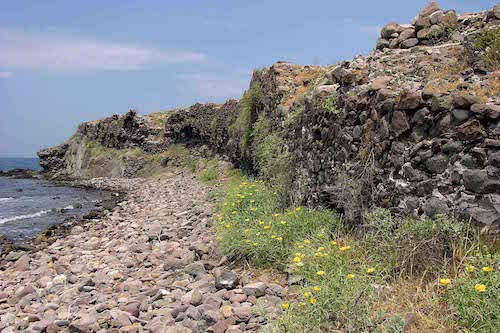(walls of ancient Antissa)
The sound of running feet over dusty cobbles disturbed the sleep of Terpander. In the narrow streets the ricochetting of bare feet and sandals sounded even louder. Yawning, the young Terpander threw a cloth around him and ran outside, where he joined groups of excited men, chatting women and screaming children who were hurrying towards the beach, a little outside of the town gates. The name of Orpheus could be heard, which made Terpander wondering: hadn’t this musician a while ago been murdered by a bunch of crazy women?
On the beach all the townspeople seemed to be there. A large circle of people gathered around something Terpander could not see. Along with Terpander the priest of the Temple of Apollo had also come running. Immediately the gathered crowd made way for the priest in the inner circle. There he fell on his knees and pointed his arms to the sky. It was only then that Terpander understood what had washed ashore that morning: the head and the lyre of Orpheus! The priest bundled the head into a red cloak and carefully, in his outstretched arms, took the head to the temple, after which it was placed in a cave where it could tell oracles. The fishermen who had found the singer’s head and instrument then threw the lyre into the hands of Terpander, who trembled with excitement.
Since then the music of Orpheus took hold of Terpander. He just had to lift his head to hear the wind in the trees and bring him joyful sounds. In the evenings he performed in tavernas trying the new melodies out. To better catch the soft changing notes of the music, he added three strings to the four strings Orpheus’ lyre originally had. Which was a success and Terpander became a traveling musician and wandered as far as Lydia where he attended various banquets. The presence of plenty of alcohol brought him inspiration for more new music and drinking songs.
The fame of Terpander’s music reached Sparta, a state much in need of an uplift. The oracle of Delphi declared: “Get the singer of Lesvos”. This was good news for Terpander who had grown bored of his hometown, it is even suggested that he had to leave town because he had murdered somebody.
Terpander started a music school in Sparta and he might even have been the organizer of the very first Carneia Festival of Sparta, in 676 BC. This annual festival became a big nine day event with all kinds of games. While the festival took place soldiers were not allowed to leave the town and all fighting was forbidden. This very nearly caused the downfall of Athens in 490 BC, because for this reason, the Spartans arrived so late to the field of the famous Battle of Marathon where the fight against the Persians was over. Fate had already decided that the Greeks won. Maybe the Carneia festival started as a music festival: fact is that Terpander won the music contest. After which he took up traveling along other festivals, like the Python festival in Delphi, which took place two years after each Olympic Games. Terpander won there four times in a row the laurel wreath, blessed by Apollo.
Terpander from Antissa became the Father of the Greek Music. He not only added strings to the lyre (and may also, in doing so, have made the very first kithara), but he also included performing and singing in his act, an art that became known as kitharôidia, where not only singing and music mattered, but also the looks and performance. Even the Romans got hooked by this Greek music act and the kitharôdians were treated as real pop stars. Terpander might have been the first musician with super star behavior: it is said that for some of his concerts, the visitors were tested on their musical knowledge, for only people who understood music were allowed to hear Terpanders music.
Around 645 BC Terpander returned to Sparta in order to again perform on the Carneia festival. During his performance he ate a fig, choked and died. For years after his death it remained a tradition that each festival in Sparta started with a performance by a kithara player from Lesvos, who could prove a connection with Terpander. They were always good musicians who mostly won the contest.
Sappho must have known of Terpander. If they ever met or if Terpander’s music stimulated Sappho’s art, are facts hidden in the dark history of those years. Just as everything I have written above about Terpander contains many questions about what is truth or not. Scientists however agree that Terpander was not a mythical person, but indeed an historical one, coming from Antissa on Lesvos. And that he indeed is the Father of Greek traditional music.











